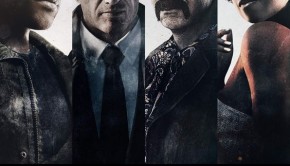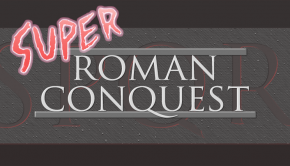Yoku’s Island Express Original Video Game Soundtrack
 |
Album Title: Yoku’s Island Express Original Video Game Soundtrack |
| Record Label: Sumthing Else Music Works |
|
| Catalog No.: SE-3227-2 |
|
| Release Date: May 29, 2018 |
|
| Purchase: Sumthing, Amazon, iTunes |
Overview
“Form ever follows function.”
For the architect Louis Sullivan, this was a physical law, as ironclad as those of thermodynamics, to be violated only by the decadent, the imbecilic, those “so utterly weak of eyesight that [they] cannot perceive this truth so simple.” Today, Sullivan’s simple truth is not only a cliché, it’s not even true of the products that most define our age. Yet this oft-misquoted and misattributed maxim still guides many designers, including those who make games. Splatoon’s fashion-forward squid kids, for example, were once simple blocks of “tofu,” shapes that lent themselves to rapid prototyping. In time those blocks became rabbits––cuddlier than coagulated soy milk, but why should either swim through ink? Form following function, tofu became rabbits which then became squids, as Darwin originally observed.
This same evolutionary process transformed the mere concept of a ball into Yoku’s Island Express, a pinball-cum-platformer and the debut of Villa Gorilla, a three-person studio in Stockholm. Co-founder Jens Andersson, a veteran of years-long tours in AAA trenches, was eager to make a game quickly. “We kicked off saying we would do something that would take maybe a year,” Andersson told GamesIndustry.biz. “So what can we do in a year? … Make a game about a ball. That seemed like a reasonable approach.” Reasonable, if restricted.
Body
Fortunately, constraints breed creativity, and from that original set of choices––make a game about a ball and do it quickly––countless others followed. Like a seed, the ball grew outward in a rhizome of function-fitting decisions, culminating in a game of remarkable freshness, if one defined by the weirdness of video game logic. In a game where the very landscape is a pinball table it makes a certain sense to find bumpers and flippers growing out of the hillsides. But how to push a ball to these points of departure? Leave it to a dung beetle, that entomological Sisyphus, and make him a postman, too, in order to explain Yoku’s determination to reach even the most remote locations on the island he calls home. Neither snow nor rain nor heat nor gloom of night (all of which map to locations in the game, incidentally) stays this courier from the swift completion of his appointed rounds.
But what sort of music should accompany this epic quest to deliver the mail to residents of Mokumana Island? For composer Jesse Harlin (Mafia III, Star Wars: The Old Republic), the game’s blend of genres laid down a songwriting blueprint. “The game is a mixture,” Harlin told The Annotator, “so I tried to do everything related to the score in mixtures.” In practical terms, this meant “[sticking] two things together that don’t necessarily go.”
Such an approach could have been disastrous, but Harlin is too smart to smash kazoo into klezmer for the sake of mere novelty. His arrangements are unusual but thoughtful, yielding 14 tracks of restless invention. The bouncy “Welcome to Mokumana Beach,” one of the soundtrack’s highlights, encapsulates his method. Beginning with a count-off in French (because “it felt hip”), the track demonstrates Harlin’s all-embracing taste, including sunny melodies made of tinny toy piano and harpsichord, followed by melodica and ocarina. Flourishes of turntablism suggest a pool party played by Sugar Ray circa 1999. It’s almost enough to make you feel the warmth of summer and the grit of beach sand between your toes.
But video game worlds are ones of contrast. Every World 1-1 must have an 8-4, and for “Mokumana Beach” it’s the trip-hop of “Gorilla Woods.” A languorous track, its electric piano and fingersnaps recall Angelo Badalamenti, but its tone is more mysterious than menacing. Notes decay into heavy air like curls of cigarette smoke in a sultry speakeasy. Harlin pairs “Woods” with “The Slug Gardener,” another fine imitation of European downtempo. Its clutch of textures, including dreamy vibraphone, theremin-like synth pads, and sample scratching, are held together by a sinuous bass line and the sharp crack of snare drum. A brooding composition, “Gardener” is suited for places where light seldom shines. Occasional interjections of nonsense speak-singing deepen a sense of dreamlike dislocation. In more indulgent hands, such flights of fancy would seem pretentious. In “Flight of the Space Monks,” Harlin chants the genetic code of yeast, but exercising good judgment, he buries this sample in the mix, making it but one of several space-age sounds in an arrangement at once mystical and futuristic, like the Space Monks themselves.
Not every track is so adventurous. “Out Down in the Underdark” pays homage to David Gilmour of Pink Floyd fame. Its muted keyboards and brushed drums ensure listeners remain fixed on the bluesy guitar solo that runs most of the track’s four minutes. Though technically excellent, the composition is straightforward, conventional, and therefore underwhelming when compared to the commixture of sounds that precede it. Yoku’s best tracks meld seemingly incongruous flavors — is that sitar, tabla, and mandolin I hear on “Spina and the Skullgangers”? But some of Harlin’s concoctions are more appetizing than others. “The Ceremony of Healing” begins promisingly enough; its buzzy reed and trilling flutes would sound at home in a Renaissance faire. But not twelve seconds later, a squall of discordant saxophone appears, blowing heavy weather before vanishing as abruptly as it appeared. Afterward the track continues as… dubtronica? I’m left with the impression of unfinished song fragments cram-jammed together rather than carefully paired as elsewhere on the album. The same goes for “What Lies Beneath.” With its faux-Polynesian scatting, waterphone scrapes, and alternating bebop soloists, it all holds together, if barely, thanks to walking bass and hand drums. But it almost needs the urgency of gameplay to put listeners in the right frame of mind. Out of context, it sounds more gimcrack than cracking.
Summary
These are the moments when Harlin’s reach exceeds his grasp, but I’m grateful that he tried in the first place. Here is a soundtrack full of styles heard too rarely in video games, which seem to admit of only two genres: chiptune and orchestral music. Given a free hand, Harlin has produced one of the most original and inventive soundtracks heard in any medium this year. Like the game in which it appears, the music is a testament to independence and its undreamt possibilities. Roll on, Jesse. Jesse, roll on.
Do you agree with the review and score? Let us know in the comments below!
4
Posted on December 2, 2018 by Michael Hughes. Last modified on December 5, 2018.














